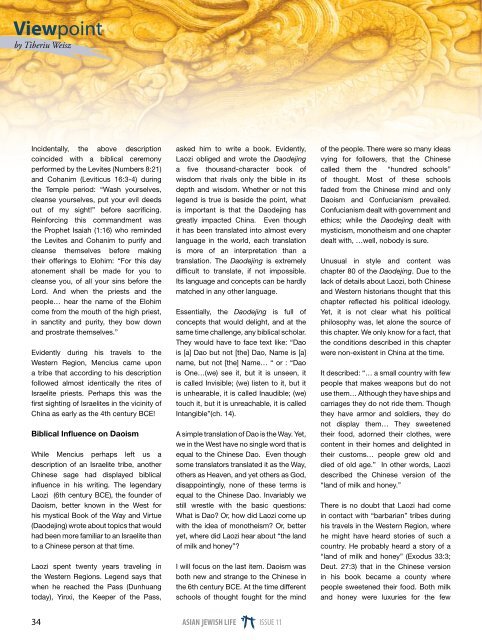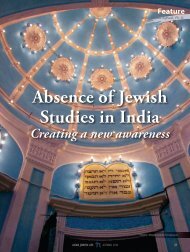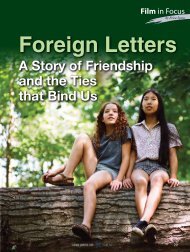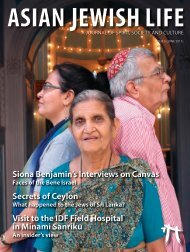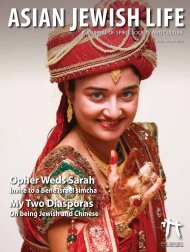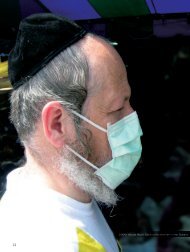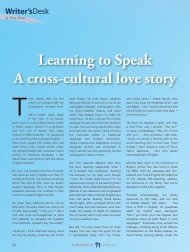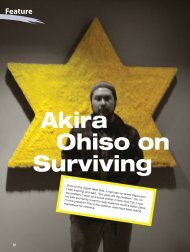AJL magazine - Asian Jewish Life
AJL magazine - Asian Jewish Life
AJL magazine - Asian Jewish Life
- No tags were found...
Create successful ePaper yourself
Turn your PDF publications into a flip-book with our unique Google optimized e-Paper software.
Viewpointby Tiberiu WeiszIncidentally, the above descriptioncoincided with a biblical ceremonyperformed by the Levites (Numbers 8:21)and Cohanim (Leviticus 16:3-4) duringthe Temple period: “Wash yourselves,cleanse yourselves, put your evil deedsout of my sight!” before sacrificing.Reinforcing this commandment wasthe Prophet Isaiah (1:16) who remindedthe Levites and Cohanim to purify andcleanse themselves before makingtheir offerings to Elohim: “For this dayatonement shall be made for you tocleanse you, of all your sins before theLord. And when the priests and thepeople… hear the name of the Elohimcome from the mouth of the high priest,in sanctity and purity, they bow downand prostrate themselves.”Evidently during his travels to theWestern Region, Mencius came upona tribe that according to his descriptionfollowed almost identically the rites ofIsraelite priests. Perhaps this was thefirst sighting of Israelites in the vicinity ofChina as early as the 4th century BCE!Biblical Influence on DaoismWhile Mencius perhaps left us adescription of an Israelite tribe, anotherChinese sage had displayed biblicalinfluence in his writing. The legendaryLaozi (6th century BCE), the founder ofDaoism, better known in the West forhis mystical Book of the Way and Virtue(Daodejing) wrote about topics that wouldhad been more familiar to an Israelite thanto a Chinese person at that time.Laozi spent twenty years traveling inthe Western Regions. Legend says thatwhen he reached the Pass (Dunhuangtoday), Yinxi, the Keeper of the Pass,asked him to write a book. Evidently,Laozi obliged and wrote the Daodejinga five thousand-character book ofwisdom that rivals only the bible in itsdepth and wisdom. Whether or not thislegend is true is beside the point, whatis important is that the Daodejing hasgreatly impacted China. Even thoughit has been translated into almost everylanguage in the world, each translationis more of an interpretation than atranslation. The Daodejing is extremelydifficult to translate, if not impossible.Its language and concepts can be hardlymatched in any other language.Essentially, the Daodejing is full ofconcepts that would delight, and at thesame time challenge, any biblical scholar.They would have to face text like: “Daois [a] Dao but not [the] Dao, Name is [a]name, but not [the] Name… “ or : “Daois One…(we) see it, but it is unseen, itis called Invisible; (we) listen to it, but itis unhearable, it is called Inaudible; (we)touch it, but it is unreachable, it is calledIntangible”(ch. 14).A simple translation of Dao is the Way. Yet,we in the West have no single word that isequal to the Chinese Dao. Even thoughsome translators translated it as the Way,others as Heaven, and yet others as God,disappointingly, none of these terms isequal to the Chinese Dao. Invariably westill wrestle with the basic questions:What is Dao? Or, how did Laozi come upwith the idea of monotheism? Or, betteryet, where did Laozi hear about “the landof milk and honey”?I will focus on the last item. Daoism wasboth new and strange to the Chinese inthe 6th century BCE. At the time differentschools of thought fought for the mindof the people. There were so many ideasvying for followers, that the Chinesecalled them the “hundred schools”of thought. Most of these schoolsfaded from the Chinese mind and onlyDaoism and Confucianism prevailed.Confucianism dealt with government andethics; while the Daodejing dealt withmysticism, monotheism and one chapterdealt with, …well, nobody is sure.Unusual in style and content waschapter 80 of the Daodejing. Due to thelack of details about Laozi, both Chineseand Western historians thought that thischapter reflected his political ideology.Yet, it is not clear what his politicalphilosophy was, let alone the source ofthis chapter. We only know for a fact, thatthe conditions described in this chapterwere non-existent in China at the time.It described: “… a small country with fewpeople that makes weapons but do notuse them… Although they have ships andcarriages they do not ride them. Thoughthey have armor and soldiers, they donot display them… They sweetenedtheir food, adorned their clothes, werecontent in their homes and delighted intheir customs… people grew old anddied of old age.” In other words, Laozidescribed the Chinese version of the“land of milk and honey.”There is no doubt that Laozi had comein contact with “barbarian” tribes duringhis travels in the Western Region, wherehe might have heard stories of such acountry. He probably heard a story of a“land of milk and honey” (Exodus 33:3;Deut. 27:3) that in the Chinese versionin his book became a county wherepeople sweetened their food. Both milkand honey were luxuries for the few34 ASIAN JEWISH LIFE ISSUE 11


